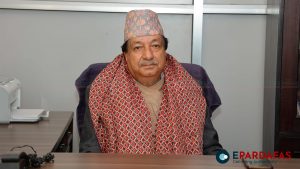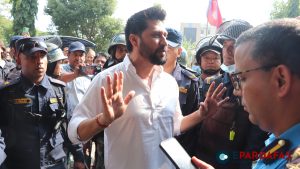
China Ignores US Moves Toward Rebuilding Relations
Secretary of State Anthony Blinken recently traveled to China for meetings with the Chinese Communist Party (CCP) on mounting concerns related to the support of Russia and the conflict with Taiwan.
En route to Beijing, Mr. Blinken stopped in Shanghai and was met with a subdued reception by a Shanghai Foreign Affairs Office deputy director. This tepid welcome underscores the challenging state of U.S.–China relations, hinting at the limited prospects for substantive outcomes from Blinken’s visit.
Before Mr. Blinken’s trip, President Joe Biden signed a $95 billion aid package, earmarking $8 billion for military assistance to Taiwan and the broader Asia-Pacific region. The Wall Street Journal also reported on April 23 that the United States is contemplating expelling certain Chinese banks implicated in facilitating Russian transactions from the international financial system.
Diverse Diplomatic Tactics
Independent television producer Li Jun stated on the “Pinnacle View” program that “the core focus of Blinken’s visit to China remains tethered to Beijing’s alleged support for Russia, a matter having a significant impact on the Russia-Ukraine war, the entire Europe, and even the United States. The U.S. Congress passed the aid to Ukraine bill, and the U.S. Senate is saying that it must be passed because it involves the Russia-Ukraine war, which is a conflict between democracy and authoritarianism.”
“But the atmosphere between the United States and China remains frosty, if not frozen,” said Li Jun.
He said there was a prevailing chill in U.S.–China relations. Chinese Ministry of Foreign Affairs spokesperson Wang Wenbin preemptively dismissed U.S. accusations regarding China’s involvement in bolstering Russia’s military capabilities as baseless and hypocritical. In light of this, the prospects for meaningful dialogue during Mr. Blinken’s visit appear bleak, with little common ground for constructive engagement.
Ha Jin, a professor from the University of Boston, said on “Pinnacle View” that Americans are unwavering in confronting this perceived threat. While their actions may appear measured on the surface, their underlying objectives are clear and decisive. Analogous to the aggressive measures taken to eradicate Asian carp, the United States is willing to employ unconventional tactics to neutralize perceived threats.
Mr. Ha said that Mr. Blinken’s arsenal includes potent tactics, such as the potential disclosure of assets held by influential members of the CCP in the United States. This underscores the array of options at the U.S. disposal in its dealings with the CCP, signaling a readiness to escalate tensions if necessary.
US Policy Toward China Slowly Shifting
Mr. Ha stated on the show that the United States has a long tradition of helping China, unlike other Western powers. “Since former U.S. Secretary of State Henry Kissinger established diplomatic relations with the CCP, the U.S. has slowly continued that tradition. However, the problem is that once the CCP becomes powerful, especially after Xi Jinping became the Chinese leader, they become extremely aggressive. They think that if they show their anger, others will be afraid. But in reality, that’s not the case. After you show your anger once, or several times, others will no longer regard you as serious or important.”
Mr. Ha believes Mr. Blinken’s tactics won’t deter the CCP, but kicking Chinese banks out of the SWIFT system is a significant move. “This will indeed have a devastating impact on the Chinese economy, especially on ordinary people. I’m not concerned about the government suffering losses; the key is the ordinary people. If there are no more orders, ordinary Chinese people will indeed suffer, and that’s the problem.”
Mr. Ha said, “I don’t think Blinken’s briefcase contains any important documents. His purpose for this trip was to tell Beijing that the United States could do many things. For example, someone in the United States could sue Xi Jinping, saying that he was derelict of duty and intentionally spread the COVID-19 virus around the world, resulting in the deaths of so many people. This is not impossible. Litigation in the United States and the West is very serious, and one of the basic principles is that if you have a valid claim, you must win. Trump even said that if one person dies of COVID-19, China should pay $10 million. So, what if this happens in the future? The CCP will not pay compensation. If they don’t pay, then what? That means war. If you look at the United States, this time, it aims to disclose the assets of the standing members of the CCP Central Committee, members of the Central Political Bureau, and provincial party secretaries. This is just one part of this grand strategy.”
Shi Shan, a columnist and senior editor of the Chinese edition of The Epoch Times, said on “Pinnacle View” that “previously, in international relations, when discussing issues between China and the United States, CCP officials thought that throwing tantrums was a big card. This behavior is very ridiculous in modern state-to-state relations. After the establishment of diplomatic relations between the CCP and the United States in 1979, there have been several stages. There was a honeymoon period, followed by a period of close cooperation or a period of shared prosperity. However, after 2017, this relationship underwent a very rapid change. I have felt it myself in Washington, especially on the streets. You meet people from think tanks in bars or somewhere, and you find that their attitudes are changing, and it started in 2016. This phenomenon is slowly happening, clearly moving in this direction. The Americans mean that since you always think of us as enemies, then let’s be it.”
Taiwan Issue Continues to Challenge US-China Relations
Guo Jun, editor-in-chief of The Epoch Times’ Hong Kong edition, said on “Pinnacle View” that “the Taiwan issue stands as a pivotal aspect of U.S.–China relations, delineating overlapping red lines for both parties.”
“The Chinese Communist Party (CCP) insisted the United States refrain from intervening in Taiwan, while the United States stipulated the CCP abstain from using force against the island. This delicate balance was a compromise traced back to Deng Xiaoping’s pragmatic approach, which aimed to prevent Taiwan’s independence while dissuading the CCP from military action. When the United States and the CCP established diplomatic relations, the CCP was asked to make a clear commitment not to use force against Taiwan, but the CCP did not agree and only made private commitments. So the Joint Communiqué on the Establishment of Diplomatic Relations between China and the United States was issued with A Letter to Compatriots in Taiwan. The ‘nine-point proposal’ in the letter was the first time the CCP formally raised the issue of peaceful reunification. As long as it is peaceful reunification, it does not violate the CCP’s commitment to the United States.”
However, she continued, “Recent developments under Xi’s leadership indicate a departure from this consensus. Xi’s urgency regarding Taiwan, motivated by personal and historical considerations, suggests a shifting stance within the CCP hierarchy. Taiwan has become a symbolic battleground in the struggle for power and prestige.”
Guo Jun highlighted the U.S. heightened concern over the Taiwan Strait, viewing it not only as a matter of honoring commitments but also as a litmus test for global leadership in the coming decades. With geopolitical dynamics evolving, Ms. Guo said there is a shift in U.S. expertise from traditional Cold War-era Soviet studies to a more China-centric focus. This new cohort of China experts, influenced by direct experiences with Communist Party rule, including figures like Matthew Pottinger and Miles Yu, brings a nuanced understanding of CCP dynamics and a pro-Taiwan perspective into U.S. policy circles.
Assessing potential escalations, Ms. Guo speculated on Chinese retaliation in the event of actions such as expelling Chinese banks from the SWIFT system. While confrontation remains a less favored option for the CCP, Ms. Guo suggested they would take indirect measures akin to past instances of support for North Korea’s nuclear program. In this emerging landscape, Ms. Guo emphasized the formation of two distinct camps—the United States and the CCP—setting the stage for a comprehensive and irreversible confrontation. However, the precise contours of this confrontation and the possibility of tacit understandings akin to the Cold War era remain uncertain, introducing a multitude of variables into the equation.













Comments